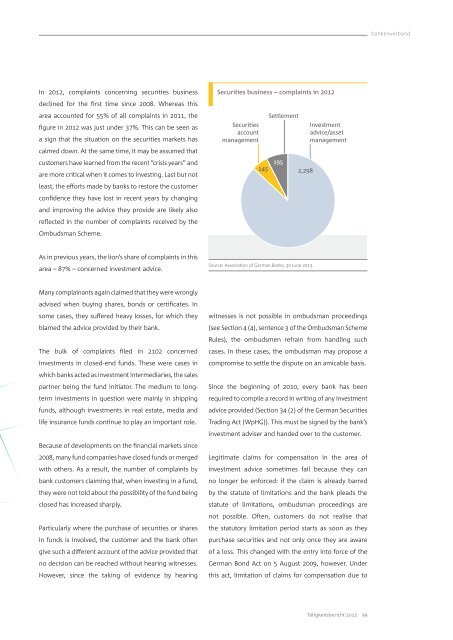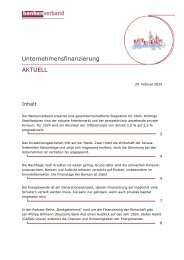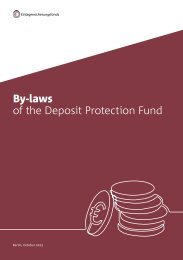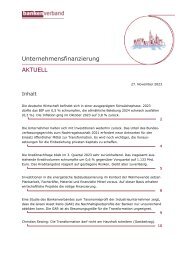Ombudsmann-Tätigkeitsbericht 2012
20 Jahre ist es her, dass der Ombudsmann der privaten Banken seine Tätigkeit aufgenommen hat. Die seither eingegangenen rund 70.000 Beschwerden haben eines gemeinsam: Sie zeigen auf, wo bei Verbrauchern im Bankgeschäft der "Schuh drückt". Ob Beschwerden im Zusammenhang mit "Schrottimmobilien", bei Wertpapieranlagen in der Finanzmarktkrise oder aktuell bei Bearbeitungsentgelten in Verbraucherdarlehensverträgen - stets spiegeln die Beschwerdeeingänge beim Ombudsmann aktuelle Anliegen, Interessen und Forderungen der Bankkunden wider. Beschäftigt hat die Verbraucher im Jahr 2012 - nicht zuletzt aufgrund eines starken Medieninteresses - die Frage der Zulässigkeit von Bearbeitungsentgelten bei Verbraucherdarlehen. Darüber hinaus rückt die europäische Dimension immer näher. Der Ombudsmann der privaten Banken sieht sich für die Umsetzung der neuen Brüsseler Regeln in deutsches Recht gut gerüstet. Er wird sich an der Umsetzungsdiskussion aktiv beteiligen.
20 Jahre ist es her, dass der Ombudsmann der privaten Banken seine Tätigkeit aufgenommen hat. Die seither eingegangenen rund 70.000 Beschwerden haben eines gemeinsam: Sie zeigen auf, wo bei Verbrauchern im Bankgeschäft der "Schuh drückt". Ob Beschwerden im Zusammenhang mit "Schrottimmobilien", bei Wertpapieranlagen in der Finanzmarktkrise oder aktuell bei Bearbeitungsentgelten in Verbraucherdarlehensverträgen - stets spiegeln die Beschwerdeeingänge beim Ombudsmann aktuelle Anliegen, Interessen und Forderungen der Bankkunden wider. Beschäftigt hat die Verbraucher im Jahr 2012 - nicht zuletzt aufgrund eines starken Medieninteresses - die Frage der Zulässigkeit von Bearbeitungsentgelten bei Verbraucherdarlehen. Darüber hinaus rückt die europäische Dimension immer näher. Der Ombudsmann der privaten Banken sieht sich für die Umsetzung der neuen Brüsseler Regeln in deutsches Recht gut gerüstet. Er wird sich an der Umsetzungsdiskussion aktiv beteiligen.
Erfolgreiche ePaper selbst erstellen
Machen Sie aus Ihren PDF Publikationen ein blätterbares Flipbook mit unserer einzigartigen Google optimierten e-Paper Software.
ankenverband<br />
In <strong>2012</strong>, complaints concerning securities business<br />
declined for the first time since 2008. Whereas this<br />
area accounted for 55% of all complaints in 2011, the<br />
figure in <strong>2012</strong> was just under 37%. This can be seen as<br />
a sign that the situation on the securities markets has<br />
calmed down. At the same time, it may be assumed that<br />
customers have learned from the recent “crisis years” and<br />
are more critical when it comes to investing. Last but not<br />
least, the efforts made by banks to restore the customer<br />
confidence they have lost in recent years by changing<br />
and improving the advice they provide are likely also<br />
reflected in the number of complaints received by the<br />
Ombudsman Scheme.<br />
Securities business – complaints in <strong>2012</strong><br />
Securities<br />
account<br />
management<br />
145<br />
Settlement<br />
195<br />
2,298<br />
Investment<br />
advice/asset<br />
management<br />
As in previous years, the lion’s share of complaints in this<br />
area – 87% – concerned investment advice.<br />
Source: Association of German Banks, 30 June 2013.<br />
Many complainants again claimed that they were wrongly<br />
advised when buying shares, bonds or certificates. In<br />
some cases, they suffered heavy losses, for which they<br />
blamed the advice provided by their bank.<br />
The bulk of complaints filed in 2102 concerned<br />
investments in closed-end funds. These were cases in<br />
which banks acted as investment intermediaries, the sales<br />
partner being the fund initiator. The medium to longterm<br />
investments in question were mainly in shipping<br />
funds, although investments in real estate, media and<br />
life insurance funds continue to play an important role.<br />
Because of developments on the financial markets since<br />
2008, many fund companies have closed funds or merged<br />
with others. As a result, the number of complaints by<br />
bank customers claiming that, when investing in a fund,<br />
they were not told about the possibility of the fund being<br />
closed has increased sharply.<br />
Particularly where the purchase of securities or shares<br />
in funds is involved, the customer and the bank often<br />
give such a different account of the advice provided that<br />
no decision can be reached without hearing witnesses.<br />
However, since the taking of evidence by hearing<br />
witnesses is not possible in ombudsman proceedings<br />
(see Section 4 (4), sentence 3 of the Ombudsman Scheme<br />
Rules), the ombudsmen refrain from handling such<br />
cases. In these cases, the ombudsman may propose a<br />
compromise to settle the dispute on an amicable basis.<br />
Since the beginning of 2010, every bank has been<br />
required to compile a record in writing of any investment<br />
advice provided (Section 34 (2) of the German Securities<br />
Trading Act (WpHG)). This must be signed by the bank’s<br />
investment adviser and handed over to the customer.<br />
Legitimate claims for compensation in the area of<br />
investment advice sometimes fail because they can<br />
no longer be enforced: if the claim is already barred<br />
by the statute of limitations and the bank pleads the<br />
statute of limitations, ombudsman proceedings are<br />
not possible. Often, customers do not realise that<br />
the statutory limitation period starts as soon as they<br />
purchase securities and not only once they are aware<br />
of a loss. This changed with the entry into force of the<br />
German Bond Act on 5 August 2009, however. Under<br />
this act, limitation of claims for compensation due to<br />
<strong>Tätigkeitsbericht</strong> <strong>2012</strong> 99


















